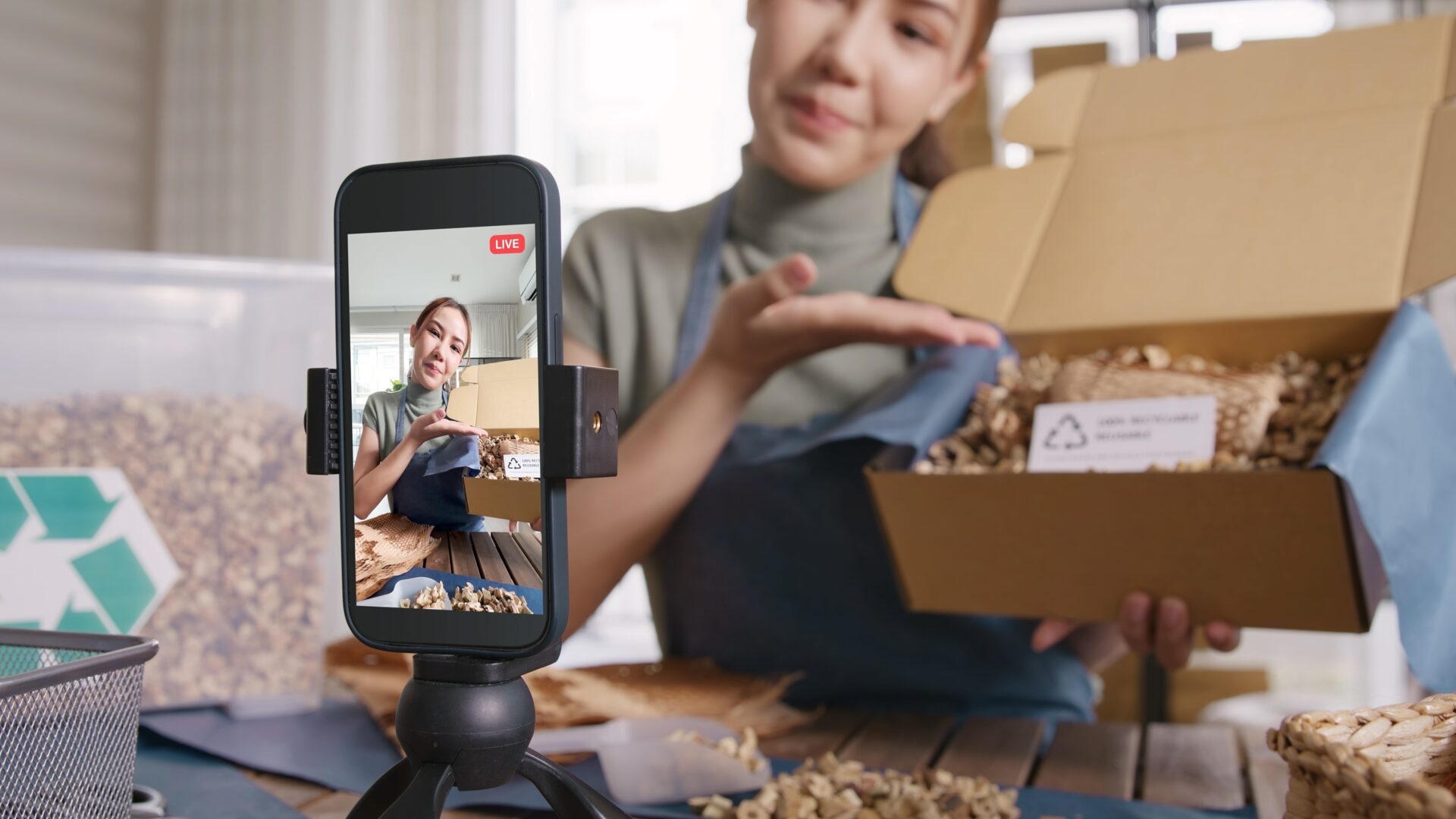Written by Evelyn Mytka, contributing writer
Many small business owners hesitate to use influencer marketing due to misconceptions about its complexity, cost, and relevance for small brands. These misconceptions can make influencer marketing seem daunting and out of reach. This blog aims to demystify influencer marketing and provide actionable insights for small businesses. By the end of this article, you’ll understand what influencer marketing is, how to identify and approach the right influencers, and how to measure the success of your campaigns.
What is Influencer Marketing?
Influencer marketing involves partnering with individuals who have a significant following on social media platforms to promote your products or services. Influencers can range from celebrities to industry experts and micro-influencers with a smaller but highly engaged audience. Influencer marketing leverages these individuals’ credibility and reach to enhance brand awareness and potentially drive sales.
Influencer marketing is vital in today’s digital landscape as consumers increasingly trust peer recommendations over traditional advertising. According to HubSpot, one in four consumers bought a product based on an influencer’s recommendation. Platforms like Instagram, YouTube, and TikTok have made it easier than ever for small businesses to connect with influencers who resonate with their brand values and target audience.
Why is Influencer Marketing Important for Small Businesses?
Benefits and Impact:
- Cost-Effective: Partnering with micro-influencers can be more affordable than traditional advertising. Micro-influencers, who typically have between 1,000 and 100,000 followers, often charge less for promotions while delivering high engagement rates.
- Targeted Reach: Influencers have followers who are already interested in your niche. For example, an influencer specializing in eco-friendly products will have an audience interested in sustainability, making it easier for relevant brands to reach their target market. This targeted approach can lead to higher conversion rates and more meaningful customer interactions.
- Increased Trust and Credibility: Recommendations from trusted influencers can enhance your brand’s reputation. According to the 2024 Influencer Marketing Report by Sprout Social, 49% of all consumers make daily, weekly, or monthly purchases because of influencer posts. This trust can be particularly valuable for small businesses trying to establish themselves in competitive markets.
- Enhanced Engagement: Influencer content often receives higher engagement rates than brand-generated content. This is because influencers have built a relationship with their audience, leading to more authentic and trusted interactions. Higher engagement can translate into increased brand loyalty and customer retention.
What are the Costs Associated with Influencer Marketing?
Budget Considerations and ROI:
- Monetary Costs: Influencer fees vary widely based on their follower count, engagement rates, and the type of collaboration. According to Shopify, the average cost of an Instagram post from a micro-influencer is between $100 and $500. However, costs can vary significantly based on the influencer’s niche, location, and level of influence. For small businesses, starting with micro or nano-influencers can be a cost-effective way to test the waters.
- Non-Monetary Costs: Time and effort required to manage relationships and campaigns. This includes researching influencers, negotiating terms, and monitoring campaign performance. Building a successful influencer marketing campaign involves ongoing communication and collaboration, which can be resource intensive.
- ROI: Successful influencer marketing can offer high ROI, particularly for small businesses focusing on micro-influencers. A study by the Digital Marketing Institute found that businesses earn $5.78 for every $1 spent on influencer marketing. To maximize ROI, it’s crucial to set clear objectives, choose the right influencers, and track performance metrics closely.
How to Identify the Right Influencers for Your Business?
Strategies for Finding Influencers:
- Alignment with Brand Values: Ensure the influencer’s content and values align with your brand. For instance, a health food company should partner with influencers who promote healthy living. Collaborating with influencers whose values resonate with your brand can lead to more authentic and effective promotions.
- Audience Demographics: Check if the influencer’s followers match your target audience. Tools like Instagram Insights or third-party analytics can provide demographic data. Understanding the demographics of an influencer’s audience helps ensure that your marketing efforts are reaching the right people.
- Engagement Rates: Prioritize influencers with high engagement rates over those with large, but less engaged, followings. Engagement rates can be calculated by dividing the total number of interactions by the total number of followers. High engagement indicates that the influencer’s audience is actively interested in their content, making them more likely to engage with your brand.
- Content Quality: Evaluate the quality and style of the influencer’s content to ensure it aligns with your brand image. Consistent, high-quality posts are more likely to engage and convert followers. Reviewing an influencer’s past collaborations can also provide insights into their reliability and professionalism.
How to Measure the Success of Influencer Marketing Campaigns?
Metrics and KPIs:
- Engagement Rates: Likes, comments, shares, and overall interaction with the content. Higher engagement indicates that the content resonates with the audience. Tracking these metrics over time helps assess the effectiveness of different types of content and influencer partnerships.
- Reach and Impressions: The number of unique users who see your content. This helps in understanding the campaign’s visibility. Tools like social media analytics and influencer platforms can provide insights into reach and impressions.
- Website Traffic: Increase in traffic to your website or landing pages. Tools like Google Analytics can track referral traffic from influencer posts. Monitoring website traffic can help determine how well your campaign is driving potential customers to your site.
- Conversions and Sales: Direct sales or conversions resulting from the campaign. Use trackable links or discount codes to measure this effectively. Analyzing conversion data helps understand the financial impact of your influencer marketing efforts.
- Brand Sentiment: Changes in how your brand is perceived post-campaign. Social listening tools can help monitor brand sentiment and identify any shifts. Understanding brand sentiment can provide valuable feedback for future campaigns and overall brand strategy.
How to Approach Influencers?
Tips for Initiating Contact and Collaboration:
- Research: Thoroughly research the influencer before reaching out. Understand their content, audience, and previous collaborations. Comprehensive research helps tailor your approach and demonstrates that you value the influencer’s unique qualities.
- Personalize Your Approach: Customize your outreach message to reflect why you’re interested in working with them. Highlight specific aspects of their work that align with your brand. Personalization shows respect for the influencer’s work and increases the likelihood of a positive response.
- Clear Proposal: Be clear about what you’re offering and what you expect in return. Include details such as campaign objectives, deliverables, timelines, and compensation. A well-defined proposal helps set clear expectations and facilitates smoother collaborations.
- Build Relationships: Aim for long-term relationships rather than one-off collaborations. This fosters trust and can lead to more authentic and effective partnerships. Long-term relationships often result in more consistent and impactful marketing outcomes.
Unlock the potential of influencer marketing for your small business. Meet with a Business Link advisor today to get personalized advice and support tailored to your needs. Book a free one-on-one meeting now.
Sources
- HubSpot: 2024 State of Marketing (2024)
- Made in CA: Digital Marketing Canada Statistics (2023)
- Sprout Social: New Research Reveals Influencers Significantly Drive Purchasing Decisions (2024)
- SHOPIFY: Influencer Pricing: The Cost of Influencers in 2024 (2024)
- Digital Marketing Institute: 20 Surprising Influencer Marketing Statistics (2024)


